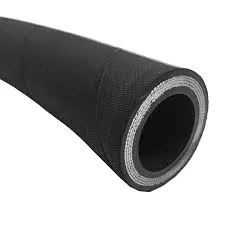Dec . 16, 2024 20:33 Back to list
High Pressure Hydraulic Hose Manufacturer with CE Certification for Reliable Performance and Safety
CE Certification for High-Pressure Hydraulic Hose Companies
In today's rapidly evolving industrial landscape, the demand for high-quality hydraulic components, particularly high-pressure hydraulic hoses, is on the rise. These hoses are essential in a multitude of applications, from construction and agriculture to manufacturing and transportation. As industries become increasingly globalized, ensuring the reliability and safety of hydraulic systems has never been more critical. This is where CE certification comes into play, serving as a benchmark for quality and safety in Europe and beyond.
Understanding CE Certification
The CE marking, short for Conformité Européenne, is a certification mark that indicates a product has met EU safety, health, and environmental protection standards. It is mandatory for various products sold within the European Economic Area (EEA). For manufacturers and suppliers of high-pressure hydraulic hoses, obtaining CE certification is essential, not only for compliance with European regulations but also for gaining a competitive edge in the market.
The Importance of High-Pressure Hydraulic Hoses
High-pressure hydraulic hoses are designed to transport fluids under pressure reliably. They are pivotal in ensuring machinery operates smoothly and efficiently. From heavy-duty construction equipment to precision manufacturing machines, these hoses must withstand extreme conditions, including high pressure, temperature fluctuations, and exposure to corrosive elements. This necessitates the highest manufacturing standards, which CE certification helps to enforce.
The CE Certification Process
The process of obtaining CE certification for hydraulic hoses involves several key steps
1. Compliance with Standards Manufacturers must begin by ensuring their products comply with relevant European directives and standards, including EN 853, EN 856, and EN 882, which outline performance requirements for various types of hydraulic hoses.
2. Testing and Evaluation Products must undergo rigorous testing to confirm they can withstand specified pressure and environmental conditions. This may include burst tests, flexibility tests, and assessments of resistance to abrasion and external damage.
3. Documentation Manufacturers must prepare a technical file that includes the design, manufacture, and operation details of the hose, along with the test results. This technical documentation must be maintained and updated as necessary.
ce certification high pressure hydraulic hose company

4. Declaration of Conformity Once compliance is verified, the manufacturer must draw up an EU Declaration of Conformity, a document declaring that the product meets all relevant EU regulations.
5. CE Marking Finally, the product can be affixed with the CE mark, signifying its compliance with EU laws and its eligibility for sale in the EEA.
Benefits of CE Certification
Obtaining CE certification offers numerous advantages for high-pressure hydraulic hose manufacturers
- Market Access CE certification is vital for gaining access to the European market. Without it, companies may face significant barriers that could limit their sales and growth opportunities.
- Consumer Confidence A CE mark instills trust in consumers and business partners. It indicates that the product has been tested and meets rigorous safety standards, which can enhance reputation and build a loyal customer base.
- Risk Mitigation Through compliance with CE standards, manufacturers can reduce the risk of product failures, liability issues, and potential recalls, thus safeguarding their business interests.
- Competitive Advantage In a crowded marketplace, having CE certification can differentiate a company from its competitors, making it more attractive to potential clients seeking reliable and safe products.
Conclusion
In conclusion, CE certification is a critical component for companies specializing in high-pressure hydraulic hoses. As industries continue to prioritize safety and quality, the significance of CE marking will only increase. By adhering to stringent regulations and maintaining high manufacturing standards, companies can ensure their products not only meet market demands but also contribute to a safer and more efficient industrial ecosystem. Embracing CE certification is not merely about compliance; it is about commitment to excellence and innovation in the hydraulic system industry.
-
Best Four Steel Wire Spiral Hose Hydraulic R12 – Durable High-Pressure Hose Manufacturer
NewsJul.08,2025
-
High-Quality 1/4 Hydraulic Hose – Soft, Flexible & Durable Rubber Hoses for Industrial Use
NewsJul.08,2025
-
1 1 2 Inch Hydraulic Flexible Hose - Durable, Reliable, High-Pressure Solutions
NewsJul.07,2025
-
High-Quality 1 2 Rubber Hose - Durable, Flexible Hydraulic Solutions
NewsJul.07,2025
-
Discover SAE Hydraulic Hose Types - High Quality & Durable Hoses from Leading Factory Supplier
NewsJul.06,2025
-
High Pressure Wire Hydraulic Rubber Hose Supplier Durable & Reliable 1SN Hose Solutions
NewsJul.06,2025
